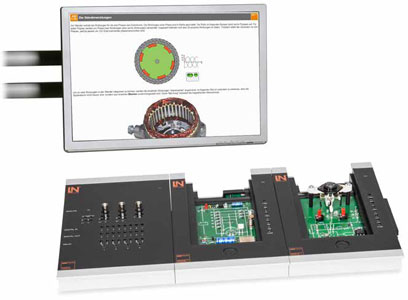Three-phase Generator (Alternator) UniTrain Course
Virtually all modern motor vehicles are equipped with a Three-phase generator to produce the required electrical energy. With this course the trainees gain insight into the generator’s basic functions and learn how to control it. They also plan and carry out diagnostics, maintenance and repair work on the power supply and the starting systems.
- Introduction to the basic terminology of magnetism/electro-magnetism
- Explaining the Lorentz force phenomenon
- Introduction to the design and function of single-phase and three-phase generators
- Experimental determination of phase-shift with a three-phase generator
- Determining the number of pole pairs of a three-phase generator by measurement
- Introduction to the functioning of diodes
- Identifying difference between Zener and normal diodes
- Introduction to the functioning of transistors
- Explain the design and function of half-wave and bridge rectifiers
- Investigation of half-wave and bridge rectifiers by measurement
- Introduction to circuits in automobiles
- Experimental determination of the functioning of a charge control light
- Experimental determination of the conditions for charging a battery
- Introduction to the principle of voltage regulation in vehicles
- Introduction to the design and function of electromagnetic and electronic voltage regulators
- Investigation of how alternator voltage depends on engine speed and load by measurement
- Measurement of threshold voltage and switching tolerance for a voltage regulator
- Fault simulation (8 simulated faults activated by relay)
Product: Three-phase Generator (Alternator) UniTrain Course
Product Code: CO4205-1X

